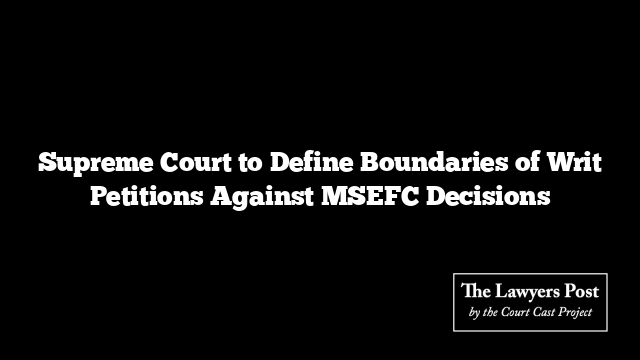The Supreme Court’s Constitution Bench is poised to deliver a pivotal ruling on whether High Courts can entertain writ petitions under Article 226 against orders issued by the Micro and Small Enterprises Facilitation Council (MSEFC). This judgment could reshape the legal framework governing remedies for micro and small enterprises in payment disputes.
Context and Referral
The MSEFC, created under the Micro, Small and Medium Enterprises Development (MSMED) Act of 2006, addresses delayed payments to micro and small enterprises (MSEs). Acting as a quasi-judicial body, it mediates disputes and, if conciliation fails, issues arbitral awards as per the Arbitration and Conciliation Act of 1996. Orders from the MSEFC can currently be challenged under Section 34 of the Arbitration Act.
A three-judge Supreme Court bench, led by the Chief Justice of India and including Justices Sanjay Kumar and Manmohan, has raised questions about the maintainability of writ petitions against MSEFC orders. The issue has been referred to a larger Constitution Bench for a definitive interpretation.
Key Legal Questions
The Constitution Bench will address three core issues:
- Scope of Writ Jurisdiction: Whether High Courts can admit writ petitions against MSEFC decisions, despite the availability of alternative remedies, and under what circumstances.
- Role of MSEFC Members: Whether members of the MSEFC, who act as conciliators, can later serve as arbitrators in the same dispute. This requires harmonizing Section 18 of the MSMED Act with Section 80 of the Arbitration Act, which generally prohibits such dual roles.
- Revisiting Precedent: The correctness of the 2023 India Glycols ruling, which held that writ petitions against MSEFC orders are not maintainable due to statutory appeal mechanisms.
Access to Justice: A Constitutional Right
The Court underscored that Article 226, a cornerstone of constitutional rights, allows citizens to seek judicial redress when statutory or constitutional rights are violated. While alternative remedies may exist, writ jurisdiction can be exercised in specific circumstances:
- Violation of natural justice or fundamental rights.
- Lack of jurisdiction by the authority issuing the order.
- Challenges to the constitutionality of a statute.
Citing precedents, including Harbanslal Sahnia v. Indian Oil Corporation, the Court noted that the exclusion of writ jurisdiction is discretionary, not absolute. Exceptional cases may warrant intervention, ensuring justice prevails even when procedural alternatives are available.
Implications
This decision could redefine the interplay between statutory remedies and constitutional rights, particularly for MSEs navigating the legal labyrinth of delayed payments. By clarifying the limits of High Court writ jurisdiction, the Supreme Court aims to balance access to justice with procedural efficiency. The Constitution Bench’s ruling will likely have far-reaching consequences for businesses and legal practitioners alike.





